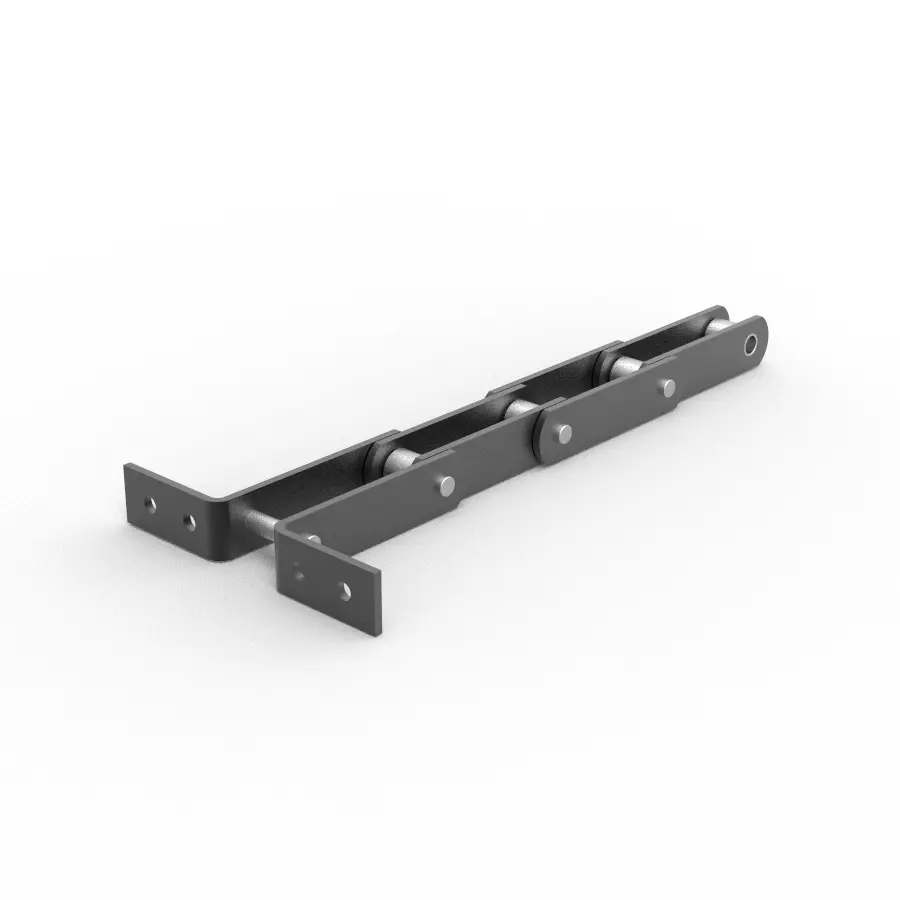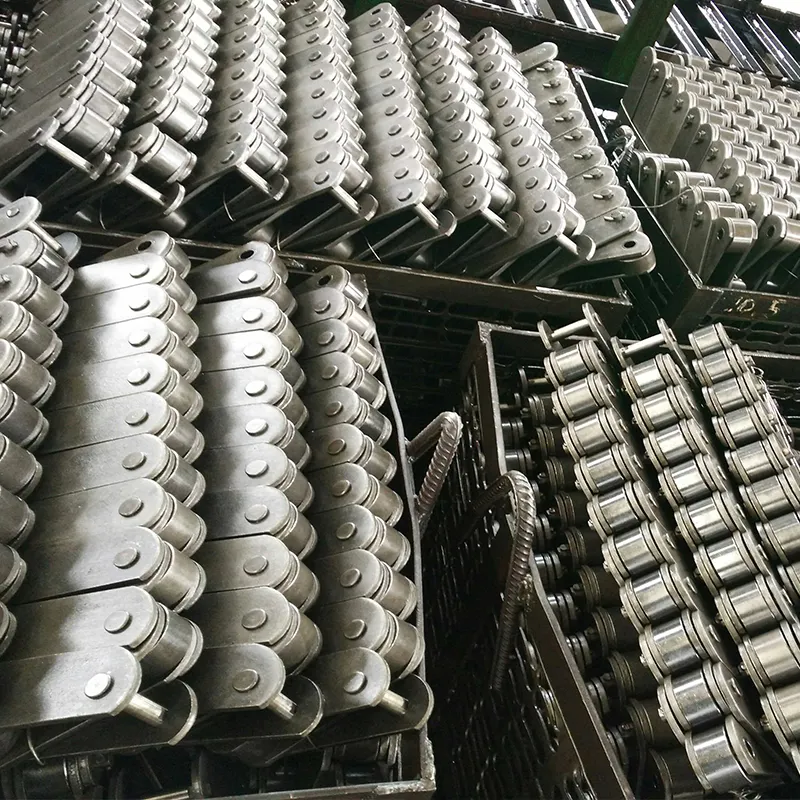Product Description
Product Description
1, Our Chain types: Agricultural roller chain, mining processing chain, motorcycle roller chain, sugar industry chain, cement industry chain, weld steel drag chains etc;
2, Main materials: It is 40Mn. 40Cr, 45Mn alloy steel, SUS304, and POM Plastic for plates, 10#, 20#, 20CrMnMo, 30CrMnTi for pins and rollers;
3, Heat treatment: Carburizing, Austemper Stressing, nitro-caburizing harden etc;
4, Surface: Shot peening, black, blue or original;
Detailed Photos
For example of heavy duty offset sidebar roller chain 1245 (3315), 4571 (5031), 4824 (6035), 3075 (13P)
Product Parameters
Packaging & Shipping
plastic bag+carton+ OSB Case
Shipping way: these products will be shipped to your local port by sea, these also could be sent to your specific address by air.
Our Advantages
Our chains could be customized according to your actual order quantity, actual drawing and actual requirement. We have own chain process workshop, heat treatment workshop, process equipments and experienced designers.
(01)Assembled workshop
(02)Punching plate workshop
(03)Plate fabrication workshop
(04)Heat treatment workshop
(05)Shot peening workshop
(06) our warehouse
After Sales Service
Our products can be repaired or replaced the new parts with free cost in six months.
/* January 22, 2571 19:08:37 */!function(){function s(e,r){var a,o={};try{e&&e.split(“,”).forEach(function(e,t){e&&(a=e.match(/(.*?):(.*)$/))&&1
| Material: | Alloy |
|---|---|
| Structure: | Roller Chain |
| Surface Treatment: | Carburizing and Quenching |
| Chain Size: | 78.11mm |
| Feature: | Heat Resistant |
| Pitch: | 78.11mm |
| Customization: |
Available
| Customized Request |
|---|
Can mill chains be used in wastewater treatment and sewage systems?
Yes, mill chains can be used in wastewater treatment and sewage systems for various applications. These chains offer specific advantages that make them suitable for such environments, where exposure to corrosive and abrasive materials is common. Here are some key points regarding the use of mill chains in wastewater treatment and sewage systems:
1. Corrosion Resistance: Wastewater and sewage often contain corrosive substances, such as acids and chemicals. Stainless steel mill chains are particularly beneficial in these environments due to their corrosion resistance, which helps to prevent premature wear and elongation of the chain.
2. Abrasion Resistance: Mill chains are designed to handle heavy loads and resist wear and abrasion, making them suitable for applications where wastewater may contain abrasive particles, sediment, or sludge.
3. Reliability: In wastewater treatment and sewage systems, reliability is crucial to maintain smooth operations. Mill chains, when properly selected and maintained, provide reliable performance and minimize downtime.
4. High Strength: Mill chains are capable of handling heavy loads and high-capacity material transfer, making them suitable for wastewater treatment processes that involve moving large volumes of liquid or solid materials.
5. Easy Maintenance: Stainless steel mill chains require minimal maintenance, which is beneficial in wastewater treatment facilities where regular maintenance can be challenging due to the nature of the environment.
6. Resistance to Harsh Chemicals: Wastewater treatment processes often involve the use of various chemicals for treatment and purification. Stainless steel mill chains can withstand exposure to these chemicals without deteriorating or compromising their performance.
7. Extended Service Life: Due to their corrosion and abrasion resistance, mill chains can have a longer service life in wastewater treatment and sewage systems compared to conventional carbon steel chains.
8. Versatility: Mill chains come in various configurations, including standard, double pitch, and heavy-duty options, allowing for versatility in designing wastewater treatment systems to meet specific requirements.
Overall, mill chains, especially those made of stainless steel, are a reliable and durable option for use in wastewater treatment and sewage systems. Their corrosion and abrasion resistance, high strength, and low maintenance make them well-suited for handling the challenging conditions and materials encountered in these applications.
Can mill chains be used in material handling systems in recycling facilities?
Yes, mill chains can be used in material handling systems in recycling facilities. Recycling facilities often handle various types of materials, and mill chains are versatile and durable enough to handle the demands of recycling operations. Here’s how mill chains are suitable for material handling in recycling facilities:
1. Strength and Durability: Mill chains are designed to withstand heavy loads and are made from robust materials such as alloy steel, making them suitable for handling bulk materials and recyclables.
2. Versatility: Mill chains are available in different sizes and configurations, making them adaptable to different material handling needs in recycling facilities.
3. Low Maintenance: Mill chains typically require minimal maintenance, reducing downtime and ensuring continuous operation in busy recycling environments.
4. Resistant to Abrasion: In recycling facilities, materials may contain abrasive components. Mill chains are designed to resist abrasion, ensuring longer service life even in harsh conditions.
5. Handling Various Materials: Mill chains can handle a wide range of materials, including metals, plastics, paper, and other recyclables, making them suitable for diverse recycling applications.
6. Efficient Material Transfer: With proper design and installation, mill chains facilitate smooth and efficient material transfer within recycling systems.
7. Customization: Mill chains can be customized to suit specific material handling requirements in recycling facilities, ensuring optimal performance.
8. Environmental Considerations: Some mill chains are available with eco-friendly features, such as using recycled materials or environmentally friendly lubricants, aligning with the sustainability goals of recycling facilities.
Overall, mill chains are a reliable and effective solution for material handling systems in recycling facilities, contributing to the efficient processing of recyclable materials and supporting sustainable waste management practices.
Can mill chains handle heavy loads and high-capacity material transfer?
Yes, mill chains are specifically designed to handle heavy loads and high-capacity material transfer in various industrial applications. These chains are built to withstand the demands of heavy-duty material handling processes and are commonly used in industries like steel manufacturing, mining, lumber handling, and more. Here’s why mill chains are suitable for such tasks:
1. High Tensile Strength: Mill chains are made from high-quality materials, such as carbon steel or stainless steel, which provide them with excellent tensile strength. This allows them to bear heavy loads without deformation or failure.
2. Robust Construction: The design of mill chains includes robust components and attachments that can handle the stress of heavy loads and maintain their integrity during material transfer.
3. Large Pitch Size: Mill chains typically have larger pitch sizes compared to standard roller chains. The larger pitch allows for greater material clearance between chain links, making them suitable for transferring bulky materials and handling large loads.
4. Attachment Options: Mill chains can be customized with various attachments, such as scrapers, pushers, or carrying rollers, to suit the specific requirements of material handling processes. These attachments enhance the efficiency and effectiveness of high-capacity material transfer.
5. Smooth Operation: Despite their ability to handle heavy loads, mill chains are designed for smooth and consistent operation. This ensures that the material transfer process remains stable and reliable, preventing potential disruptions in industrial operations.
6. Resistance to Wear and Corrosion: Mill chains are engineered to resist wear and corrosion, even in harsh and abrasive environments. This extends their service life and ensures reliable performance in demanding applications.
7. Safety Considerations: The design and construction of mill chains prioritize safety during high-capacity material transfer. They are manufactured to meet industry standards and undergo rigorous testing to ensure safe and efficient operation.
Overall, the combination of high tensile strength, robust construction, and versatility makes mill chains well-suited for handling heavy loads and facilitating high-capacity material transfer in various industrial settings. Their reliability and efficiency contribute to smoother and more productive material handling operations in industries dealing with substantial volumes of materials.
editor by CX 2024-05-08




